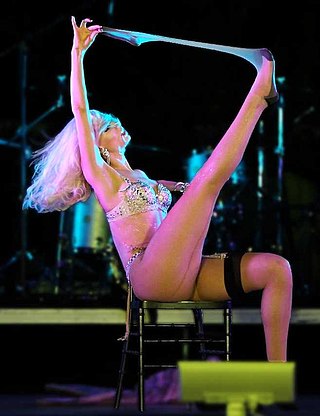
A striptease is an erotic or exotic dance in which the performer gradually undresses, either partly or completely, in a seductive and sexually suggestive manner. The person who performs a striptease is commonly known as a "stripper" or an "exotic" or "burlesque" dancer.

Mr. Baseball is a 1992 American sports comedy film directed by Fred Schepisi, starring Tom Selleck, Ken Takakura, Dennis Haysbert, and Aya Takanashi. It depicts a tumultuous season in the career of veteran New York Yankees first baseman Jack Elliot, who is traded to the Chunichi Dragons of the Japanese Central League during Spring Training, and forced to contend with overwhelming expectations and cultural differences during the Dragons' run at the pennant.

The Kliq was a backstage group in the World Wrestling Federation during the mid-1990s, composed of Kevin Nash, Scott Hall, Sean Waltman, Shawn Michaels, and Triple H. Michaels, Nash, and Hall wielded a considerable amount of power within the company at the time, which they reportedly used to positively influence one another's careers and occasionally negatively influence the careers of others.
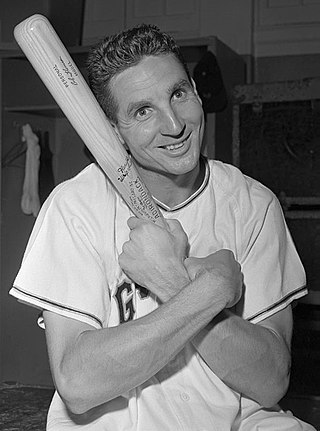
Robert Brown Thomson was a Scottish-born American professional baseball player, nicknamed "the Staten Island Scot". He was an outfielder and right-handed batter for the New York Giants, Milwaukee Braves (1954–57), Chicago Cubs (1958–59), Boston Red Sox (1960), and Baltimore Orioles (1960). His pennant-winning three-run home run for the Giants in 1951 is popularly known as the "Shot Heard 'Round the World", and is one of the most famous moments in baseball history. It overshadowed his other accomplishments, including eight 20-home-run seasons and three All-Star selections. "It was the best thing that ever happened to me", he said. "It may have been the best thing that ever happened to anybody."

Super Bowl XL was an American football game between the National Football Conference (NFC) champion Seattle Seahawks and the American Football Conference (AFC) champion Pittsburgh Steelers to decide the National Football League (NFL) champion for the 2005 season. The Steelers defeated the Seahawks by the score of 21–10. The game was played on February 5, 2006, at Ford Field in Detroit, Michigan. It is the most recent Super Bowl broadcast on ABC who lost the rights to broadcast Super Bowl games in the next NFL TV contract and the first where all aspects of the game itself were aired in HD. This was the last of 10 straight Super Bowls to feature a team seeking its first win.

Gremlins 2: The New Batch is a 1990 American comedy horror film, and the sequel to the 1984 film Gremlins. It was directed by Joe Dante and written by Charles S. Haas, with creature designs by Rick Baker. Zach Galligan, Phoebe Cates, Dick Miller, Jackie Joseph, and Keye Luke reprise their roles from the first film; Belinda Balaski also returns, this time playing a different character. New cast members include John Glover, Robert Prosky, Haviland Morris, Robert Picardo, and Christopher Lee; additionally, the film features Tony Randall providing the voice for one of the gremlins. The story continues the adventures of the creature Gizmo, who spawns numerous small monsters when wet. In the first film, Gizmo's offspring rampaged through a small fictional town. In Gremlins 2: The New Batch, Gizmo multiplies within a skyscraper in New York City after his owner dies. The new creatures thus pose a serious threat to the city should they be able to leave the building, and the story revolves around the human characters' efforts to prevent this disaster.

Russell Pleasant Hodges was an American sportscaster who did play-by-play for several baseball teams, most notably the New York Giants / San Francisco Giants. He is perhaps best remembered for his call of Bobby Thomson's "Shot Heard 'Round the World"—The Giants win the pennant! The Giants win the pennant!
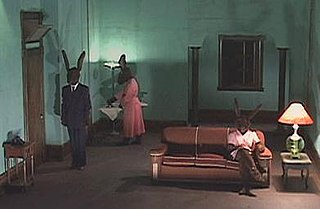
Rabbits is a 2002 series of eight short horror web films written and directed by David Lynch, although Lynch himself refers to it as a sitcom. It depicts three humanoid rabbits played by Scott Coffey, Laura Elena Harring and Naomi Watts in a room. Their disjointed conversations are interrupted by a laugh track. Rabbits is presented with the tagline "In a nameless city deluged by a continuous rain... three rabbits live with a fearful mystery".

Ralph Theodore Joseph Branca, nicknamed "Hawk", was an American professional baseball pitcher who played 12 seasons in Major League Baseball (MLB), from 1944 through 1956. Branca played for the Brooklyn Dodgers, Detroit Tigers (1953–1954), and New York Yankees (1954). He was a three-time All-Star. In a 1951 playoff, Branca surrendered a walk-off home run to Bobby Thomson of the New York Giants; the game-winning hit was known as the "Shot Heard 'Round the World".

In baseball, the "Shot Heard 'Round the World" was a walk-off home run hit by New York Giants outfielder and third baseman Bobby Thomson off Brooklyn Dodgers pitcher Ralph Branca at the Polo Grounds in New York City on October 3, 1951, to win the National League (NL) pennant. Thomson's dramatic three-run homer came in the ninth inning of the decisive third game of a three-game playoff for the pennant in which the Giants trailed 4–1 entering the ninth and 4–2 with two runners on base at the time of Thomson's at-bat.

Stop the World – I Want to Get Off is a 1961 musical with a book, music, and lyrics by Leslie Bricusse and Anthony Newley.
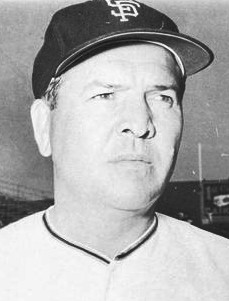
Herman Louis Franks was an American catcher, coach, manager, general manager and scout in Major League Baseball. He was born in Price, Utah, to Italian-American immigrant parents and attended the University of Utah.

Pink Floyd's sound, lighting and other stage technology set standards in the music industry. The band developed innovative use of sound effects and panning quadrophonic speaker systems in live performances from the mid-1960s until their final concerts decades later, including use of immersive live visuals.
Joshua Harris Prager is an American journalist and author.
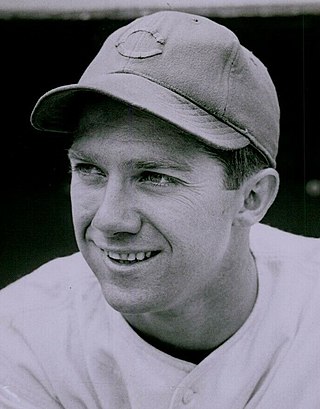
Henry Leonard Schenz was an American professional baseball player whose career lasted 14 seasons, including all or parts of six years in Major League Baseball as a member of the Chicago Cubs (1946–1949), Pittsburgh Pirates (1950–1951) and New York Giants (1951). An infielder, Schenz primarily played second base and was known for his competitive nature and prowess as a bench jockey. The native of New Richmond, Ohio, threw and batted right-handed. He stood 5 feet 9 inches (1.75 m) tall and weighed 175 pounds (79 kg).
The 1951 New York Giants season was the franchise's 69th season and saw the Giants finish the regular season in a tie for first place in the National League with a record of 96 wins and 58 losses. This prompted a best-of-three National League tiebreaker against the Brooklyn Dodgers, which the Giants won in three games, clinched by Bobby Thomson's walk-off home run, a moment immortalized as the Shot Heard 'Round the World. The Giants, however, lost the World Series to the New York Yankees in six games.

Around the World is a musical based on the 1873 Jules Verne novel Around the World in Eighty Days, with a book by Orson Welles and music and lyrics by Cole Porter. It involves an around-the-world adventure by Phileas Fogg. The expensive musical extravaganza opened on Broadway in May 1946 but closed after 75 performances.
The 1951 National League tie-breaker series was a best-of-three playoff series that extended Major League Baseball's (MLB) 1951 regular season to decide the winner of the National League (NL) pennant. The games were played on October 1, 2, and 3, 1951, between the New York Giants and Brooklyn Dodgers. It was necessary after both teams finished the season with identical win–loss records of 96–58. It is most famous for the walk-off home run hit by Bobby Thomson of the Giants in the deciding game, which has come to be known as baseball's "Shot Heard 'Round the World".

Tick, Tick... Boom! is a 2021 American biographical musical film directed by Lin-Manuel Miranda in his feature directorial debut. Written by Steven Levenson, who also serves as an executive producer, it is based on the stage musical of the same name by Jonathan Larson, a semi-autobiographical story about Larson writing a musical to enter into the theater industry. The film stars Andrew Garfield as Larson, alongside Robin de Jesús, Alexandra Shipp, Joshua Henry, Judith Light, and Vanessa Hudgens.

The Echoing Green: The Untold Story of Bobby Thomson, Ralph Branca and the Shot Heard Round the World is a nonfiction book written by Joshua Prager and originally published by Pantheon Books in 2006. The book centers on the 1951 New York Giants scheme to read opposing catchers' finger signals relayed from catcher to pitcher with a telescope in the center-field clubhouse during the latter part of the 1951 Major League Baseball season. This led to baseball's famous Shot Heard 'Round the World, when Bobby Thomson hit a three-run homer in the bottom of the ninth inning against Brooklyn Dodgers pitcher Ralph Branca, resulting in winning the three game playoff series and the National League (NL) pennant, with a 5–4 win over the Dodgers. "It's been described as the greatest baseball game ever played, and you don't have to be a baseball fan to mark the anniversary." The book expands on an article that Prager wrote in 2001 for the Wall Street Journal.


















